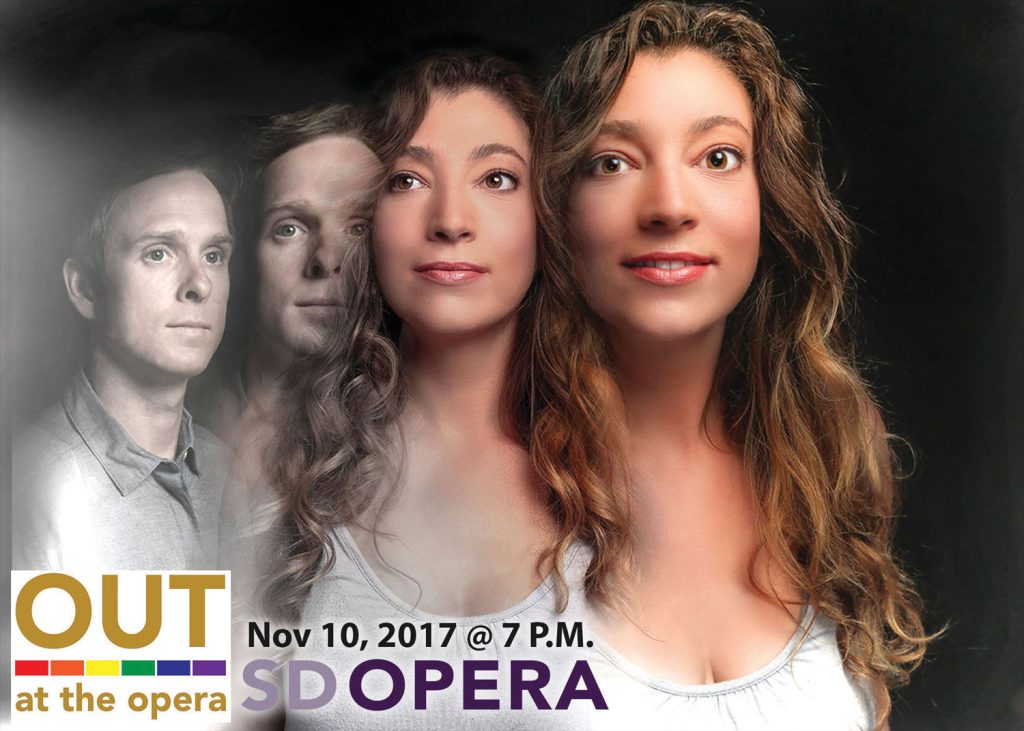TRANSFORMING THE FACE OF SELF-DISCOVERY
Blythe Gaissert
Kelly Markgraf
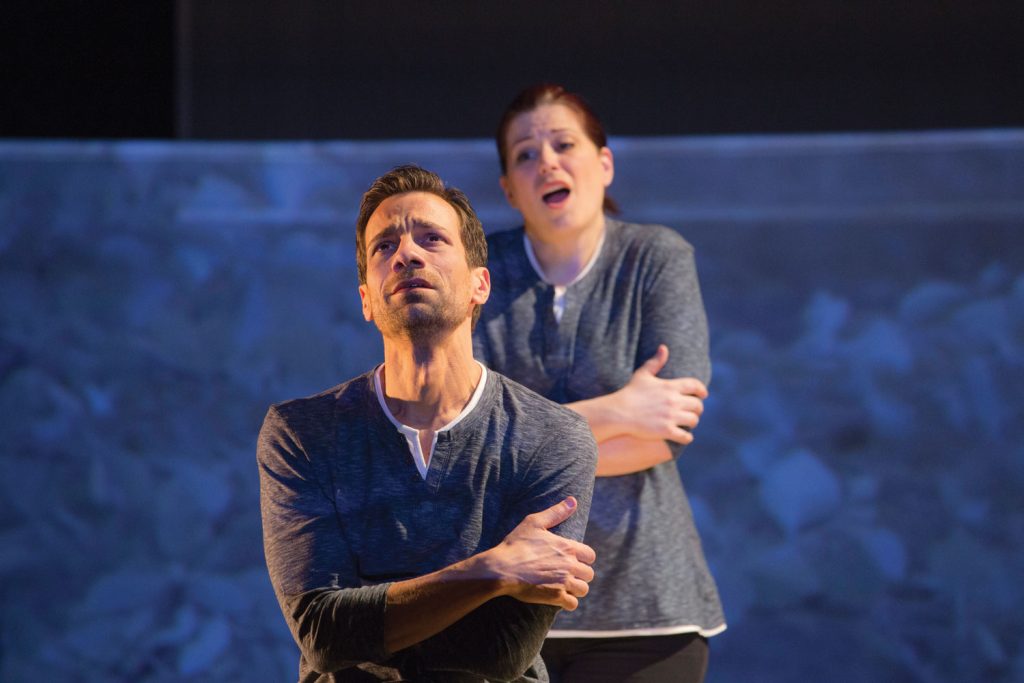
Every once in a while, you get to bear witness to something that changes not only your view on the world but alters the course for everyone who comes in contact with it. A powerful book, film, work of art, a breathtaking natural setting or a beautiful piece of music that shifts your perspective on life, doing so on many different and deep levels.
As One is definitely one of those moments. Conceived by Laura Kaminsky, with libretto by Mark Campbell and Kimberly Reed …It reaches in to its topic and opens it up in terms that everyone who sees it can relate to, even though the topic, for some, is as difficult a one to face and understand as any they have taken on. As One enlightens through telling the story of one transgender person’s innermost journey, telling it with humor, heartfelt pain and empathy.
The 75-minute chamber opera illustrates the experiences of its sole transgender protagonist, Hannah, as she works to resolve the discord between her inner and outer self and the world she must inhabit. Two singers, in this case Baritone Kelly Markgraf and Mezzo-soprano Blythe Gaissert, take on different aspects of the central character. Brilliantly expressing the process of her burgeoning awareness, discovery process, eventual acceptance, as well as the ultimate peace she finds with who she has always been…all things inspired in part by the life of acclaimed filmmaker Kimberly Reed.
As One’s rich libretto is powerful, filled with words that move the beautiful melodies and evocative harmonies forward and into your heart, make it unforgettable, illustrating in the way only music can, the struggles we all face about self-acceptance.
Markgraf and Gaissert discuss the power and impact As One has had on them and the audiences who have witnessed it.
BLYTHE GAISSERT
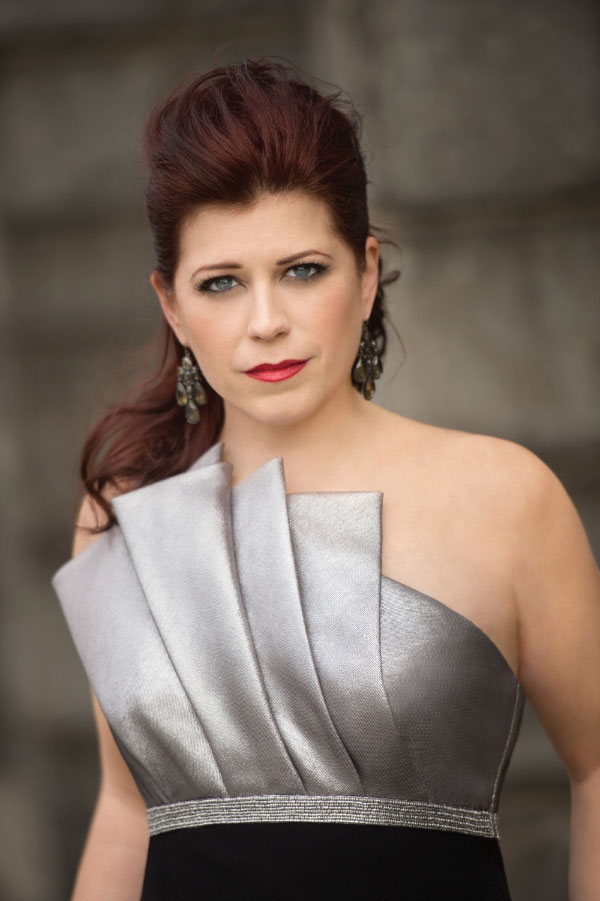
As One is a remarkable work and I have absolutely received an education about contemporary opera, preparing for this story. Just mentioning the word opera for most people associates it with something unreachable, but that really has changed in the last 10 to 20 years. Would you agree?
For sure. I do mostly contemporary opera now, I don’t know how that happened, but that’s mostly what I do. I think even just in my first encounters with contemporary music in the early 2000s—beside the text or whatever the story was—the music was a little bit more what some people might associate with contemporary music. Now I feel like it’s all kind of melding more into a mixture of styles and things people can identify with more.
I never considered myself a traditional opera singer from the very beginning. I always had my finger in a lot of different pies and liked doing a lot of different kinds of music for different reasons, I felt like it stimulated different parts of my creative brain. I’ve sung rock music, jazz, musical theatre and all different kinds of classical music. What’s really great, is that the way that contemporary classical music is being written, I get to use a lot of those different tools I’ve learned in all of those other genres, which is amazing. It used to be frowned on to exercise some of those chops: You know, “Straight tone and high arts…Oh, you’re sliding around…” that isn’t so frowned on anymore, at least in contemporary music. I feel like people welcome having a wider palette of colors to use and you’re not stuck in this sort of “It has to sound like this person” or “Let’s recreate this production…” don’t get me wrong, it has its place.
There’s such a change happening across all genres of music and in all the arts right now. What do you feel, we can attest that to? Is it the access to information online, do
you think?
I can say that a lot of the things that I’ve been affiliated with, things have become more of a conglomeration of different media, also having certain technologies available. I mean a lot of people complain that we’re such a media driven society and there’s obviously a lot of negative things about that, but as far as opera is concerned I feel like it’s really helped bring it into a new area, making it more accessible and exciting to a different group of people. Many say a younger group of people, but I don’t think it’s just about age, it’s about breaking stereotype a bit.
That’s the great thing about the information age that we live in right now. In your experience have you felt any downsides from it, as far as musicality goes?
It’s always been very tricky having a career in contemporary music. People seem to think that’s all you do or you’re not capable of doing other things. I think especially now, that’s not the case, because there are so many people doing contemporary opera across the country and not just in big places. There still is a little bit of a hangover. I certainly have felt its effect at times and even though I have done plenty of standard repertoire as well, they’re like “Oh that’s what you do now.” I also think there are a lot of people from the “old guard” if you will, that are a little afraid of change…and it really has changed so much. It’s a positive thing because it brings in a different audience. Not every TV show or movie is for every person and it’s the same with opera. You’re not going to like everything you see and that’s okay, but you can appreciate it.
That’s part of appreciating great music, great art or anything well done, it speaks to you, personally. I always find it really fascinating, if you look back at the history of classical music or opera, even Mozart was considered a radical for his time.
Even just choosing a subject, in a libretto sense. I think that’s specifically what is remarkable about As One and the reason it’s been done so much. People talk about how it’s small and less expensive for a company to produce, but beside all of that it’s a really good opera with great music and an amazing libretto. It’s so human and something everyone can identify with in some way. I have always said when describing it to people—especially family members or whoever may have some sort of baggage about the word transgender—it is about that but it’s also not about that. It’s about the bigger things that everyone experiences, not feeling comfortable in your own skin and how do you become yourself.
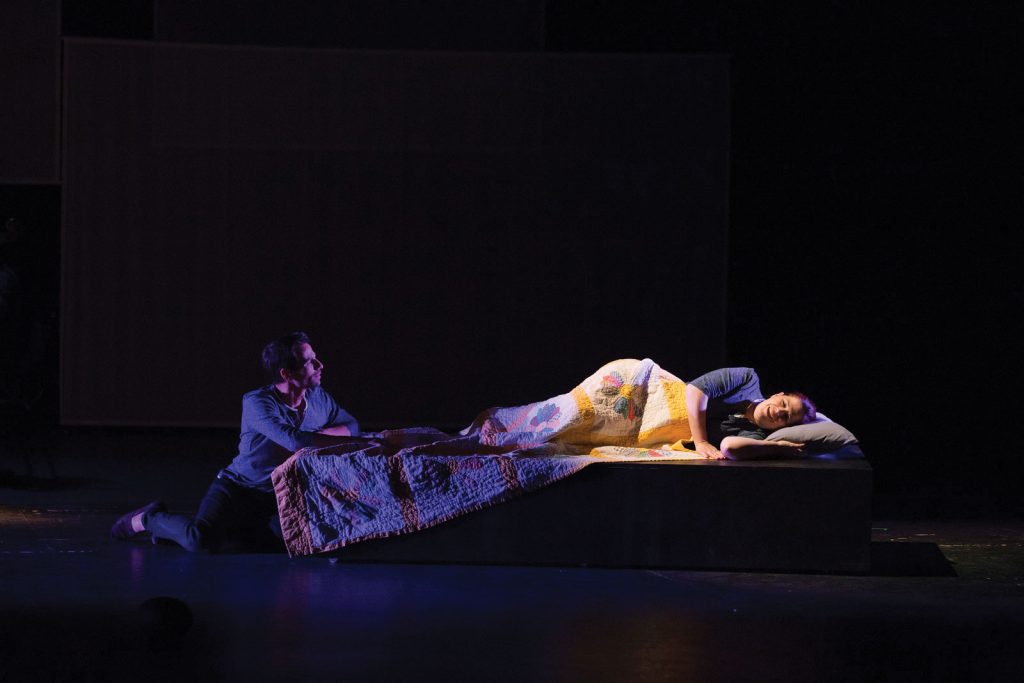
I couldn’t agree more.
I think that’s why it’s so important that people see As One. In Colorado last winter, we often did a talk back session after the show. Obviously, you have a sizable liberal community and a large gay community there, with a really great organization called One Colorado, who were a big part of our discussion and were members on the panel. We had a couple of transgender people stand up and speak in such heartfelt ways, about how they were so excited and pleased to see their story being told. We also had this clearly conservative, older white guy stand and say, “Well, I don’t really know about all this stuff, but I could kind of appreciate it.” You could tell it affected him in a way that he wasn’t really even able to verbalize. I don’t know how other people feel, but that is why I do this show. I feel like it makes some sort of a difference to people.
You and Kelly Markgraf were both heavily involved from the very beginning.
Kelly and his wife Sasha did the premiere and so before that happened, Laura [Kaminsky] had written about two thirds of it at that point. She had not written the entire third part and there were several parts in, that had since been taken out, replaced with something else and skimmed down. The very first iteration of it, Charles Jarden from American Opera Projects called me and said, “I have this project that I really want you to be a part of. I think it will be really great for you.” I had just gotten through having a young son and working on an amazing project and I felt like, “This is what I want to do, I want to do things that really mean something.” It just felt so good to feel like I was working with a bigger vision and had something not just about themselves.
I had this year where nothing happened and I was so sad, I remembered just sitting in my living room with my son next to me and I was like, “I really need the universe to throw me a bone…I just need something and I don’t care what it is.” I needed to be passionate about something and feel like it’s going to make a difference in the universe. A piece that offers something to people, shakes things up and changes people’s minds…and I swear, literally, that day Charles called me.
I love it. What an amazing story. How have the responses differed as you’ve gone through the process of performing it?
You know, to be totally honest I’ve never had a negative response from anybody. My dad is always the ultimate test for me and as he says, “The music is really weird honey, but you sounded great…” Like he doesn’t get it, but he loves the music. He loved when I did Hansel & Gretel, that was totally his jam. (Laughs) But with As One, he’s still a little uncomfortable with the subject matter. When I told him I was first working on the project, he was like, “Well, okay I don’t really understand all of that but, good for you.” He hasn’t seen a whole production yet, only some excerpts online, but I think he actually likes it.
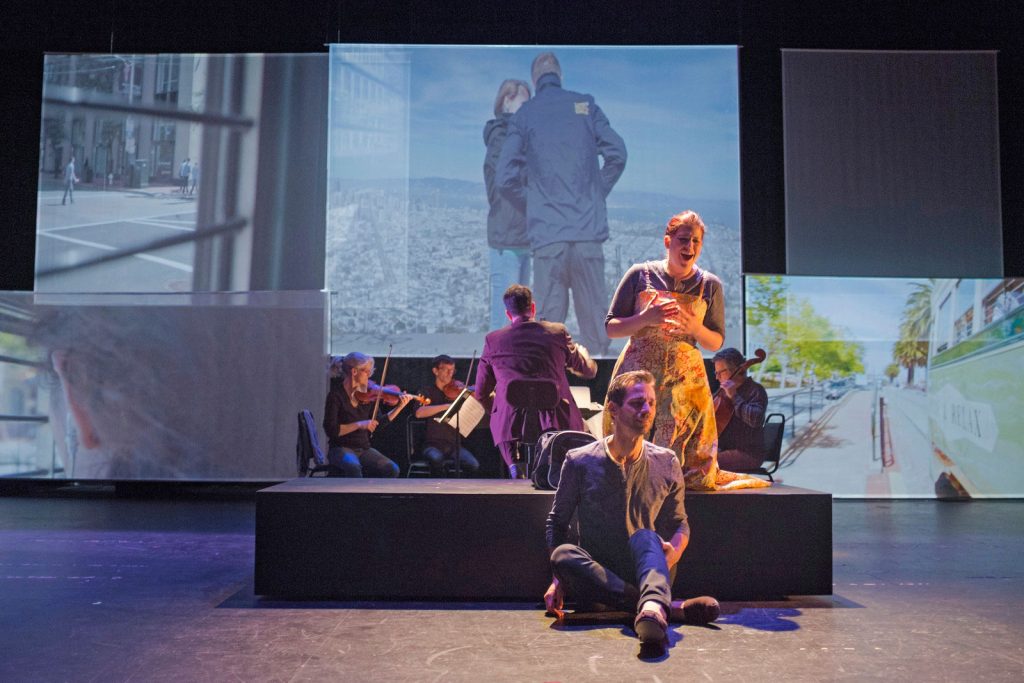
In interviews that I do and people that I talk to, I look for the things that are talking about change and about trying to enlighten the process. Conversations with or about people who have preceded change or brought change with them and things that do that. That’s one of the reasons I was so drawn to and fascinated with As One. There’s this magical thing that happens with music, it can imbue the experience of emotion musically and this opera absolutely does that.
Yes. It’s really hard for both of us to do, emotionally, too. Unfortunately, there’s a section where they list the murdered and missing trans people and every time that we do it, Mark [Campbell] and Kim [Kimberly Reed] make changes to the list and add people. It’s like a constant reminder this is not in the past, this is something that is happening today. People don’t believe it when you say that it’s happening, they’re like “What are you talking about?” I think until it’s become more prevalent in the media, people don’t know…and to be completely honest, I had no idea either.
Every single time we do As One, I feel so humbled by the people that we meet and the reaction. It sounds funny, but it’s kind of a relief to be a part of something that you feel like is making a difference. When I was in Utah this woman came up to me at the dinner afterwards…she was a young woman in her early 30’s, with five kids and Mormon. She was very sweet and polite and said “Thank you so much for your performance. I think that everyone in Utah needs to see this.” I was just floored and she said she felt it was so important because she thought it would help people understand each other better. This sweet, simple, small town Mormon girl, totally got it. There was also a faculty member who reached out to us and said she was going to begin her transition.
Having her community see this and have such a positive reaction really helped her to know she wasn’t going to be completely shunned. There are other people in her community who didn’t approve and had a problem with it, but I feel that’s the impact it has. It’s great when it’s done in the city because everyone gets to see it. But, when it’s performed in those tiny communities like that, I feel like it’s really getting to people.
KELLY MARKGRAF
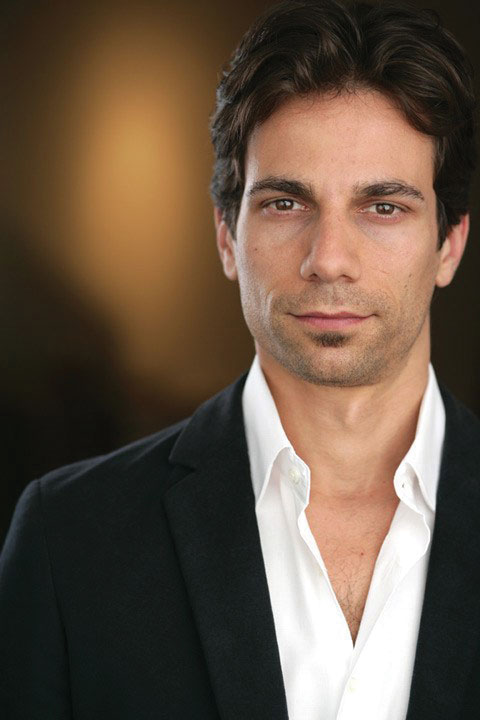
I’m so fascinated by this opera, in particular the story, but also how popular it has become. Especially in the context of the times we’re living because there has been so much push back around the transgender community and that it’s been performed against that backdrop. How did you initially become involved?
My wife Sasha and I have both sung for Laura Kaminsky the composer. She used to run Symphony Space on the Upper West Side in New York City, which was a very progressively-minded institution. We had done some really interesting stuff together. She had been in Russia, I think it was in St. Petersburg in the library there, she had asked the librarian, “I’m looking for something of Shostakovich’s that people in America might not know about.”
It was one of those moments that she was for sure happy she asked, because the librarian said. “Give me one second…” She walks away and comes back with a manuscript and says, “No one knows about this.” It was a manuscript of songs and popular melodies, patriotic melodies and opera arias, things like that, that Shostakovich had transcribed for only violin and occasionally violin/viola…The maximum size being a string quartet along with the singers. They were called the “Front Ways Songs” meaning the war front and he had written them specifically to take out to Russian soldiers on the front for entertainment purposes.
Laura is incredibly interesting and brought back these songs for string quartet and singers and we premiered them at Symphony Space. I had known her maybe eight years or so and we had randomly kept in touch, when she came across this idea based on a New York Times article about a New Jersey couple, one of which wanted to transition. It meant that they’d be in a same-sex relationship and all of a sudden, they were thrown into turmoil around the legalities and around keeping benefits, which gave her the idea to write an opera around it. She contacted my wife and I and said, “I really want to write this opera for you guys, will you do it?”
It really sort of came to us from the beginning and once Mark and Kim wrote the libretto, they sent it along. I still recall sitting down with Sasha to read through our parts, sort of like a script reading and we both sat there in tears, having trouble holding it together. It was because they had written something so clairvoyant and to the core of what the human struggle is. It doesn’t matter what your orientation is. Whether it’s what you might call in slang terms, about an uber-straight guy who is insecure about his own identity, wondering who likes him, what group he fits into, or whatever it might be.
I’m of the mind set that sexual orientation, even gender orientation, exists on a spectrum. No matter where you exist on that spectrum, people really do have the same kind of struggles. We all have those voices in our heads that drive us crazy, making us unhappier than we should be. The truth of this, even though I had never been a person who was well-acquainted with transgenderism, partially because of my Wisconsin upbringing, but even through my city life, I had never really come across it strangely enough. Yet, even though I hadn’t been exposed to that on a personal level, reading through this script really sort of manhandled me, emotionally.
That was my first exposure to the piece as well, reading the libretto. You are absolutely right, it was a powerful, emotional journey through an incredibly well-thought out, charged verse. I look for ways to enlighten understanding in what I do. Ways to reach across divides, this is why As One was such a powerful draw, because it does illustrate the transgender journey, yet it’s done in a way that everyone can relate to… that process of self-discovery.
It really captured my wife and I and fortunately, Laura wrote a score that even though it’s complex musically, once you get through the complex rhythms and the other challenges it offers, the audience gets something that is truly elevating for the text. One of the hardest parts to get through in the whole show without falling apart is the letter poem called, “Home for the Holiday.” It’s when Hannah is first transitioning and can’t face the idea of seeing her parents, because she hasn’t told them yet that she’s going through it.
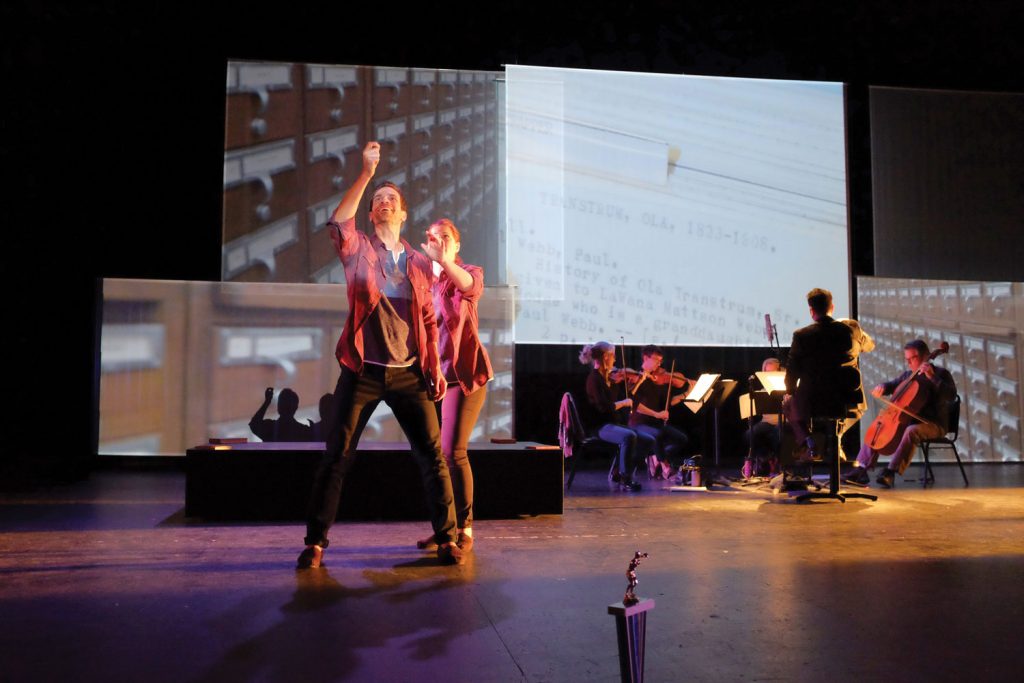
The letter that she writes about it being her first Christmas coming back is intense. The production of that opera in Colorado we did last spring was particularly intense, in that one moment because, the director decided to add a supernumerary into the show, a female extra nearing seventy years old, the perfect mom, the iconic-looking mother. She came onstage from behind me (Hannah), just as I was composing that letter home, carrying a paper in her hand too, implying that she had read the letter already. As my writing came to a close, she came downstage and I could actually kind of feel her presence behind me as she did it, she put her hand on the back of my head like a mom might do and ran her fingers through my hair…It was so intense.
Everybody knows that feeling, at once exhilarating because you are claiming sovereignty as an adult or as having your own sense of self. But, it’s also deeply sorrowful to be breaking those bonds and moving away from something you were so used to referring back to. It just captures so much.
The San Diego Opera’s premiere of As One takes pace at the Joan B. Kroc Theatre, 6611 University Avenue in San Diego form Friday, November 10 through Sunday, November 12. An Out Night discount of $10 is available for Friday night’s performance, featuring a pre-show lecture. For tickets and more information, go to sdopera.org.
